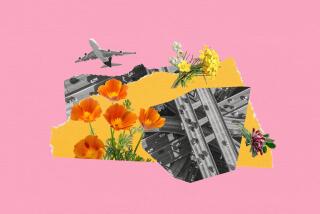Karl Linn, 81; Gave Up Landscape Design for Community Gardens
- Share via
Karl Linn, a landscape architect who worked with some of the leading architects in the country but later turned to creating community gardens, including a number of them in Berkeley, has died. He was 81.
Linn died of leukemia at home in Berkeley, his wife, Nicole Milner, said.
In a hopscotching career, he went from child psychotherapist to landscape architect and teacher, first at the University of Pennsylvania, later at the Massachusetts Institute of Technology and the New Jersey Institute of Technology.
In the 1950s he was the landscape architect for the Seagram Building in New York City, designed by Ludwig Mies van der Rohe, and the interior landscape architect for the Four Seasons restaurant that was designed by Philip Johnson. Eventually, however, Linn found landscape design unsatisfying. Most of his work was for wealthy people in the suburbs.
“Everything was designed for isolation,” Linn said of suburban life in an interview with Sierra magazine. “There were no benches where women could sit and talk; no playgrounds close by and often no sidewalks, just cars. It was like a green desert.”
He turned his attention to restoring blighted urban areas, making them into park-like settings, using the same basic elements that he used for his wealthy clients. In his view, nature was essential to human health and wellbeing.
“From time immemorial, people of indigenous or land-based cultures have celebrated their connectedness with nature as an integral part of their daily lives,” Linn wrote in a 1999 essay for New Village magazine. “Free and enduring access to air, water and land assured their sustenance and survival.”
He first learned these lessons as a boy in his native Germany. He was born and raised on a farm near the village of Dessau. His mother taught horticulture as a form of therapy for the mentally ill. His father was a librarian and editor of a Jewish literary journal.
With the rise of Nazism, the Linns fled Germany for Palestine, now Israel, in 1934. For the rest of his life, he worked toward social justice.
“My experience with racism motivated me to devote my life to contribute to the emergence of a humane society,” Linn said in a 2003 documentary, “A Lot in Common.” Among many projects aimed at that goal, Linn recently helped form a Jewish-Palestinian dialogue group in the Berkeley area.
After his family moved to Palestine, Linn graduated from Kadoorie Agricultural School near Haifa in 1941. He then moved to Switzerland, where he trained to be a psychoanalyst at the Institute of Applied Psychology in Zurich.
After completing his studies in 1946, he immigrated to New York City.
He developed a private practice and helped to found a school for emotionally disturbed children.
By the early 1950s Linn was phasing out his work as a psychotherapist in favor of landscape design. In 1959 he began teaching at the University of Pennsylvania School of Fine Arts.
He encouraged his students to work with him on renewing run-down community spaces by planting greenery, adding benches and building a play area for children.
In one early project in Philadelphia, he oversaw the restoration of an alley between a women’s prison and a vacant lot.
He invited the neighbors to bring old dinner plates and smash them on the site. The pieces were used to pave the alley.
Linn retired from teaching in 1986 and moved to Berkeley, where he helped start several community gardens, working hands-on in each case.
One of the sites, the Peralta Community Garden, had been a vacant plot surrounded by barbed wire near a subway tunnel. Linn and volunteers turned it into a space defined by a garden gate, a pond, native grasses and a mosaic bench.
Another restored area, across the street from the Peralta gardens, was officially named the Karl Linn Community Garden on his 70th birthday in 1993.
It includes 15 garden plots and a potting shed that is used for ecological experiments. “One can always turn a liability into an asset,” Linn said of the project.
Besides his wife, Linn is survived by a son from an earlier marriage, three stepchildren, a brother and three grandchildren.
His two previous marriages ended in divorce.
Contributions in Linn’s name can be made to Friends of the Westbrae Commons, P.O. Box 13673, Berkeley, CA 94712.
The funds will be used to maintain the community gardens Linn helped create in the area.
More to Read
The biggest entertainment stories
Get our big stories about Hollywood, film, television, music, arts, culture and more right in your inbox as soon as they publish.
You may occasionally receive promotional content from the Los Angeles Times.










